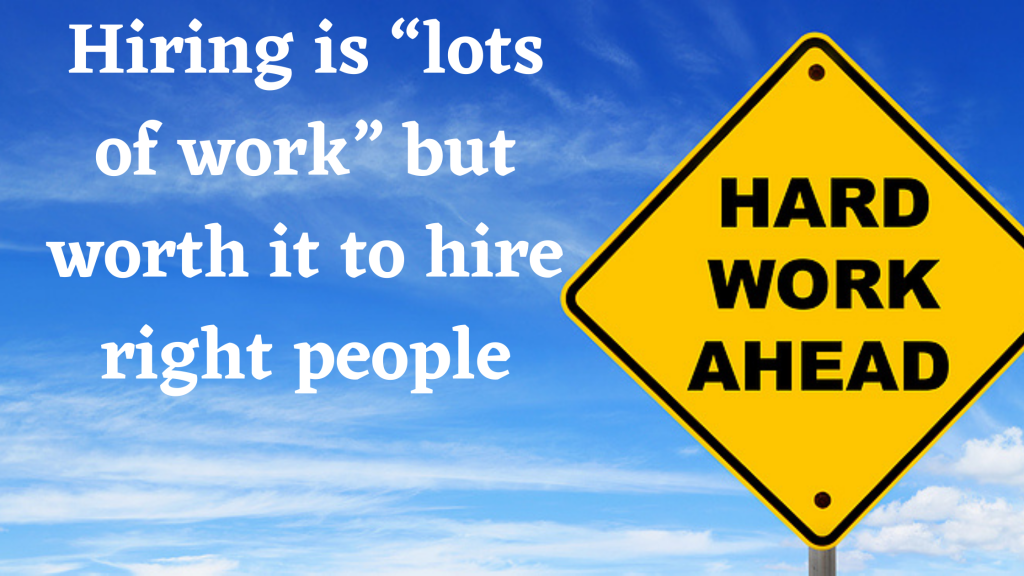
It only took being asked a single question about two decades ago to shift the course of my career as a consultant, author and speaker.
At the end of an Interview Right to Hire Right workshop, a participant asked: “You told us how to hire the right people, but how do we keep them? It seems like a lot of work if they just turn around and leave and we have to find someone else.”
“Let them know they are appreciated,” I responded. At the time, I really wasn’t sure what I meant by that. Luckily, no one asked.
Since then, I have spent much of my time discovering what I meant and how to show that staff members are valued as individuals and appreciated for what they do. Eventually, this question led me to write Thanks! GREAT Job!
But enough about that. This article is not about staff recognition. The focus is on the something else the questioner said:
“It seems like a lot of work.”
That’s true. Interviewing right takes a lot of work, but that’s necessary if you want to make better hiring decisions.
In the words of the legendary American auto executive, Lee Iacocca, “The most important thing a manager can do is to hire the right new people.”
To understand why hiring is so much work, let’s consider all that’s required before you can confidently decide who to hire:
Be clear who you are looking for – Before you can hire the right new person, you must know who the right people currently on staff are or who they were among those you have worked in the past. In a previous article, I referred to these top performers as people who you would love to clone. What makes them successful? How do they respond in circumstances they frequently encounter? Begin your search with these competencies and attitudes in mind and you will be taking an important step toward hiring more people who will make your organization successful.
Prepare to learn how candidates have performed in previous jobs –
Most decisions are based on what we learn about products or services we are considering buying. What are friends’ experience with this appliance? What is the repair record and fuel consumption of this vehicle? How do others feel about the food and service at this restaurant? How has the value of this mutual fund changed over the last one, five or 10 years? Intuitively, we understand that, “Past performance is the best predictor of future performance.” This same principle applies when hiring. Write questions to learn what candidates did when they encountered situations similar to those that your staff commonly experience. The better the match between the behaviour candidates describe and what your top performers do, the more likely it is that you have found the right person to hire.
Probe to learn more about candidates’ past performance – From reading mystery novels and watching crime dramas you know that detectives and trial lawyers are seldom satisfied by what they first hear from witnesses and suspects. They probe for more information. They ask followup questions to learn more. To hire the right people you should do the same. Candidates will seldom tell you everything about what they did. For every initial inquiry you make, be prepared to ask followup questions to get the full story.
Assess what candidates tell you – Before asking, think about how candidates might respond to your questions. What answers would you consider unsatisfactory (not at all as your top performers would do it)? What would be an outstanding (top performer-like) response to the situation? Create a rubric for assessing the candidates’ answers.
Use reference checks to confirm what candidates said and your assessment of what you heard – The lists of references candidates provide include people you don’t know, who were carefully selected to portray the candidate in the best light. In their opinion, the candidate is the best person for your job, whatever it is. Rather than asking references their opinion of the candidate, require them to describe what the candidate did in specific situations. How did they respond to situations similar to those your current staff deals with?
Not knowing what they are looking for, asking the wrong interview questions, failing to probe for additional information, having no criteria to assess candidates, and wasting reference checks are among 13 reasons managers are “unlucky” when making hiring decisions—all mistakes that can be avoided.
Planning, interviewing and checking reference takes a lot of time and effort, but the work is worth it if it results in you hiring the right people.
==
I can help you improve your chances of hiring the right people to make your organization a success. Contact nmscott@telus.net to request one-on-one coaching sessions or to schedule an Interview Right to Hire Right workshop for your leadership team.

